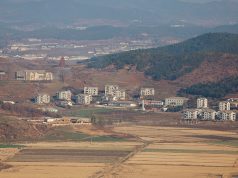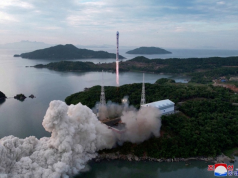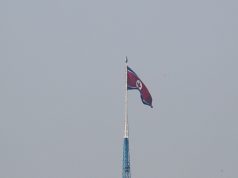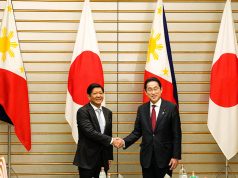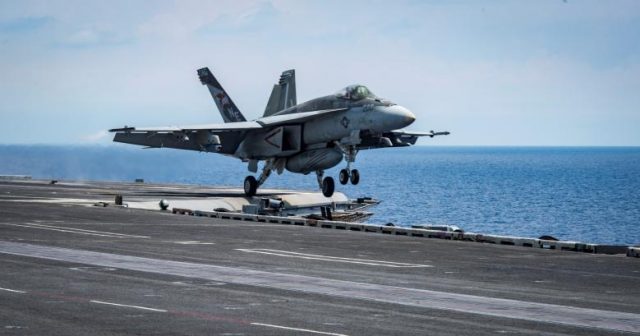
WASHINGTON – US President Donald Trump said a “major, major conflict” with North Korea was possible over its nuclear and ballistic missile programs, while China said the situation on the Korean peninsula could escalate or slip out of control.
Trump, speaking to Reuters on Thursday, said he wanted to resolve the crisis peacefully, possibly through the use of new economic sanctions, although a military option was not off the table.
“There is a chance that we could end up having a major, major conflict with North Korea,” Trump said in an interview at the Oval Office.
“We’d love to solve things diplomatically but it’s very difficult,” he said, describing North Korea as his biggest global challenge.
Chinese Foreign Minister Wang Yi said there was a danger that the situation on the Korean peninsula could escalate or slip out of control, his ministry said.
Wang made the comments in a meeting at the United Nations with a Russian diplomat on Thursday, the ministry said in a statement.
China, the only major ally of North Korea, has been increasingly uncomfortable in recent months about its neighbor’s pursuit of nuclear weapons and long-range ballistic missiles in violation of UN resolutions.
The United States has called on China to do more to rein in Pyongyang and Trump lavished praise on Chinese President Xi Jinping for his efforts, calling him “a good man”.
“I believe he is trying very hard. I know he would like to be able to do something. Perhaps it’s possible that he can’t. But I think he’d like to be able to do something,” Trump said.
US Secretary of State Rex Tillerson said on Thursday that China had asked North Korea not to conduct any more nuclear tests. Beijing had warned Pyongyang it would impose unilateral sanctions if it went ahead, he added.
Tillerson did not say when China made the threat. He is due to chair a meeting with UN Security Council foreign ministers on Friday, where he said he would stress the need for members to fully implement existing sanctions as well as possible next steps.
Chinese Foreign Ministry spokesman Geng Shuang, asked about Tillerson’s remarks, would not say what actions China might take if there were a new nuclear test and would not comment directly on what Tillerson had said.
“We oppose any behavior that goes against Security Council resolutions. I think this position is very clear. This is what we have told the United States. I think North Korea is also very clear about this position,” Geng told reporters.
China banned imports of North Korean coal in February, cutting off its most important export, and Chinese media this month raised the possibility of restricting oil shipments to the North if it unleashed more provocations.
Geng said Friday’s UN meeting should not fixate on new sanctions.
“If the meeting only focuses on increasing sanctions and pressure, I think this will not only lose a rare opportunity, it may also exacerbate the confrontation between all sides and may damage efforts to promote peace and talks,” he said.
Missile defense, carrier group
In a show of force, the United States is sending the USS Carl Vinson aircraft carrier group to waters off the Korean peninsula, where it will join the USS Michigan, a nuclear submarine that docked in South Korea on Tuesday. South Korea’s navy has said it will hold drills with the US strike group.
Admiral Harry Harris, the top US commander in the Pacific, said on Wednesday the carrier was in the Philippine Sea, within two hours’ striking distance of North Korea if need be.
Harris also said a US missile defense system being deployed in South Korea to ward off any North Korean attack would be operational in coming days.
China has been angered by the deployment of the Terminal High Altitude Area Defense (THAAD), complaining that its radar can see deep into China and undermines its security.
Trump said in the interview he wants South Korea to pay the cost of the THAAD, which he estimated at $1 billion. South Korea, one of Washington’s most crucial allies in the region, said the United States would have to bear the cost, pointing to possible friction ahead.
Trump’s remarks came as South Korea heads into a presidential poll on May 9 that will likely elect liberal frontrunner Moon Jae-in, who has said the next administration in Seoul should have the final say on THAAD.
Trump has vowed to prevent North Korea from being able to hit the United States with a nuclear missile, a capability experts say Pyongyang could have some time after 2020.
North Korea has conducted five nuclear tests and numerous missile tests, including one this month, a day before a summit between Trump and Xi in Florida.
North Korea, technically still at war with the South after their 1950-53 conflict ended in a truce, not a treaty, regularly threatens to destroy the United States and says it will pursue its nuclear and missile programs to counter perceived US aggression.
“Trump is recklessly resorting to the hackneyed methods, being utterly ignorant of the DPRK,” the North’s KCNA state news agency said on Friday, citing a commentary from the Rodong Sinmun newspaper and referring to the North by its official name, the Democratic People’s Republic of Korea.
“Unshakable is the faith and will of the army and people of the DPRK to build a socialist power … and no force can check their advance.”
Trump, asked if he considered North Korean leader Kim Jong Un to be rational, said he was operating from the assumption that he is rational. He noted that Kim had taken over his country at an early age.
In Moscow, Russian President Vladimir Putin and visiting Japanese Prime Minister Shinzo Abe called on North Korea and other countries on Thursday to avoid behavior or rhetoric that could increase tension.




